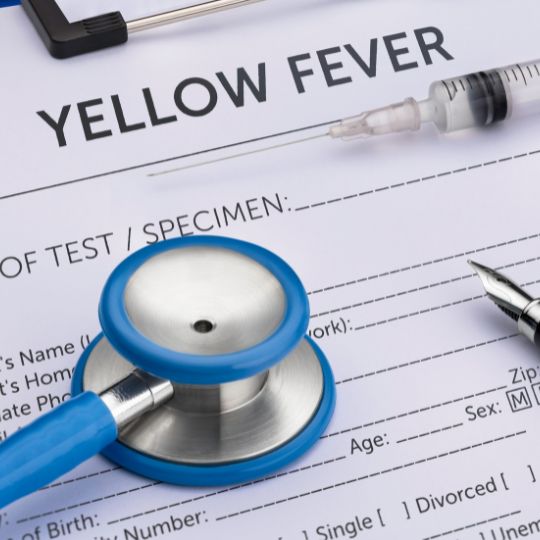Are you organizing an unforgettable safari in Kenya? But wait, before you start to make arrangements to go and get your camera ready and pack your bags, vaccinations should not be overlooked as far as your health is concerned.
This is an all-inclusive guide on recommended vaccinations when planning to visit Kenya though the major focus will be on the yellow fever immunizations and other recommendations.
Yellow Fever Vaccination: Your Golden Ticket to Kenya

What is Yellow Fever?
Yellow fever is a viral infectious disease that can cause death if not treated in humans and is spread through the infected mosquito. This is especially prevalent in some areas of Africa, including Kenya, thus immunization against this virus is recommended for travelers.
The International Certificate of Vaccination against Yellow Fever
When traveling to Kenya, a valid yellow fever vaccination certificate is more than just a recommendation—it’s a requirement. Here’s what you need to know:
- Mandatory Requirement: Persons traveling from countries with a risk of yellow fever should produce a certificate at the point of entry.
- Validity: The given certificate is lifetime, three weeks after the vaccination.
- Proof: Take an International Certificate of Vaccination or Prophylaxis commonly known as the ‘yellow card’ as evidence.
Yellow Fever Vaccination Exemptions
While the yellow fever vaccine is generally safe, some individuals may be exempt:
- Children up to 9 months of age (except during epidemics)
- Pregnant women but not during the outbreak period.
- Those with anaphylactic reactions to eggs
- Patients with hypo-agammaglobulinemia and thymus diseases
If you belong to any of these groups, approach your doctor to be given a medical exemption certificate.
Beyond Yellow Fever: Other Essential Vaccinations for Kenya

While yellow fever is the headline act, there are several other vaccinations you should consider before your Kenyan adventure:
- Hepatitis A
This is an annual food and water-borne disease found in Kenya. It is safe and recommended for all travelers as it has high efficacy in preventing the flu virus.
- Typhoid
An important food and water-borne disease is typhoid it is recommended if you are going to eat food on the streets or venture out into the countryside.
- Hepatitis B
For extended visits or if one expects to come in contact with blood or other body fluids, hepatitis B is recommended.
- Meningitis
The meningococcal vaccine is recommended, particularly if you travel during the dry season or to rural areas.
- Rabies
If your travel plan involves any interactions with wildlife or if you are planning an adventurous trip involving lots of physical activities in the wilderness, it will be wise to go for the rabies vaccine.
Malaria Prophylaxis: A Critical Evaluation
Although prophylaxis is not a vaccine, it is crucial to take when traveling to Kenya, especially during malaria. Consult your doctor about appropriate anti-malarial medications and remember to:
- Start taking them before your trip
- Continue throughout your stay
- Complete the course after returning home
COVID-19 Requirements: Staying Updated

As of July 2024, the COVID-19 measures in Kenya have been eased when it comes to entry into the country. However, it’s always wise to stay informed about the latest regulations:
- Measures such as presenting the vaccination card or a negative COVID-19 test certificate upon arrival are no longer in place.
- Only travelers with flu-like symptoms need to fill out the passenger locator form on the ‘jitenge’ platform.
- Passengers with symptoms may be offered to take a COVID-19 antigen test upon arrival at their own expense.
For updated information on the current COVID-19 measures in place for travel to Kenya, check the official Ministry of Health Kenya website.
Planning Your Vaccination Schedule
To ensure maximum protection, start planning your vaccinations well in advance of your trip:
- 6-8 weeks before travel: Schedule a consultation with a travel health specialist.
- 4-6 weeks before travel: Get your yellow fever vaccine (if needed) and start other vaccination courses.
- 2-4 weeks before travel: Complete any vaccination series and obtain your yellow fever certificate.
- 1 week before travel: Double-check all your health documentation and pack a basic first-aid kit.
Welcoming Kenya with Peace of Mind
By taking care of your vaccinations and health precautions, you’re setting the stage for an incredible Kenyan experience. From the breathtaking Maasai Mara to the pristine beaches of Diani, you’ll be free to immerse yourself in Kenya’s natural wonders and rich culture without worrying about preventable illnesses.
Remember, while vaccinations are crucial, they’re just one part of staying healthy during your travels. Don’t forget to practice good hygiene, use insect repellent, and drink only bottled or boiled water.
With the right preparations, your Kenyan adventure will be filled with nothing but unforgettable memories and life-changing experiences. So get those vaccinations sorted, and get ready for the journey of a lifetime in magical Kenya!





